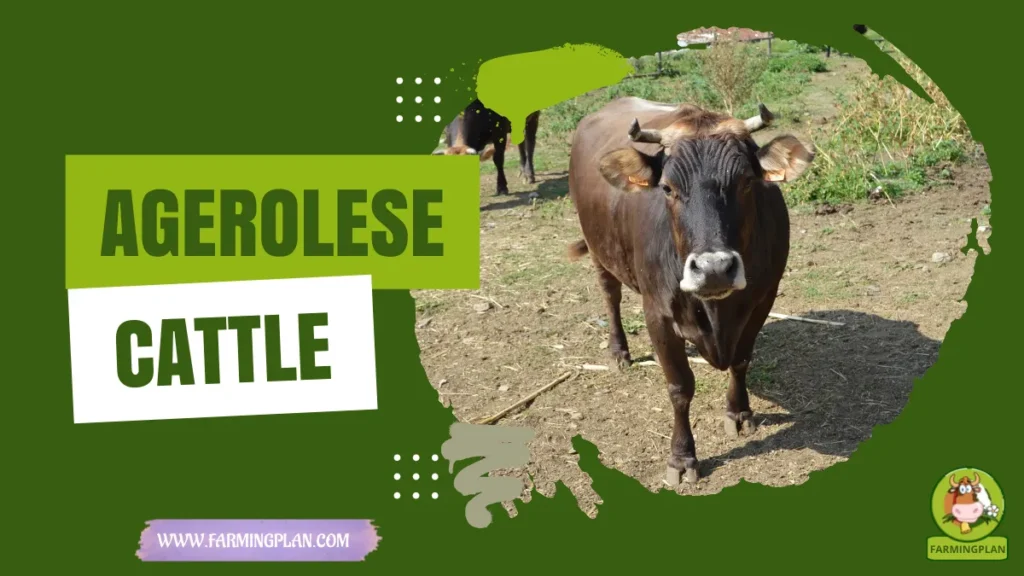If you’re after a compact, friendly, and adorable animal for your farm or family, the African Pygmy Goat is a perfect pick. I’ve raised many goat breeds, but these little ones always stand out with their curious nature, gentle temperament, and easy care. Originally from West Africa, they’ve adapted well to life in both rural backyards and suburban settings. Whether you’re a seasoned farmer or a new pet lover, these mini goats bring loads of joy without taking up much space. In this quick guide, I’ll cover their history, traits, and daily care to help you decide if the African Pygmy Goat is the right fit for your lifestyle.
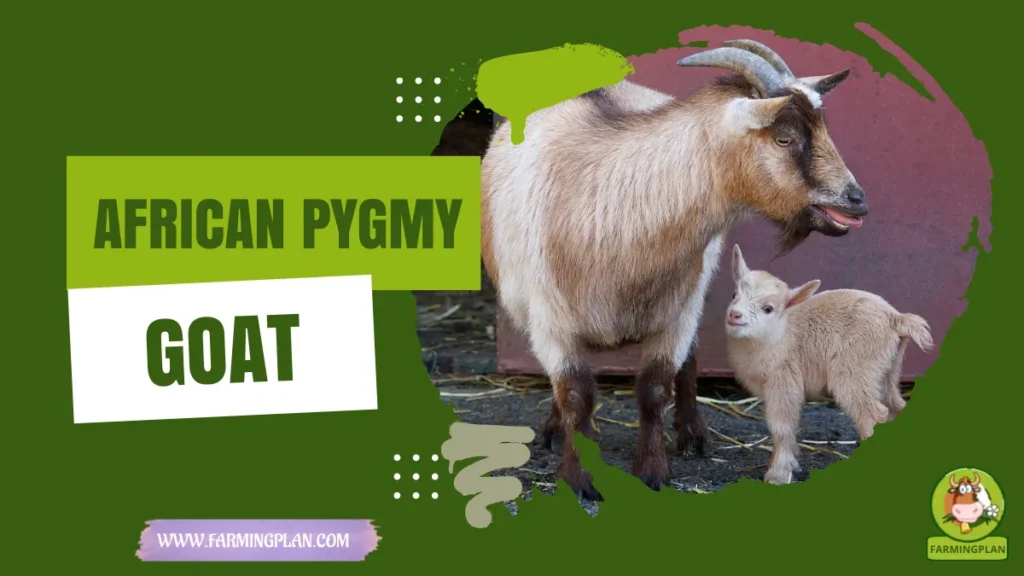
History & Origin of African Pygmy Goat
African Pygmy Goats trace their roots to the forest-dwelling goats of West and Central Africa. These indigenous goats were small, hardy, and adapted to hot climates and rough terrain. They were originally brought to the United States and Europe in the 1950s and 60s for use in zoos and research due to their manageable size and docile nature.
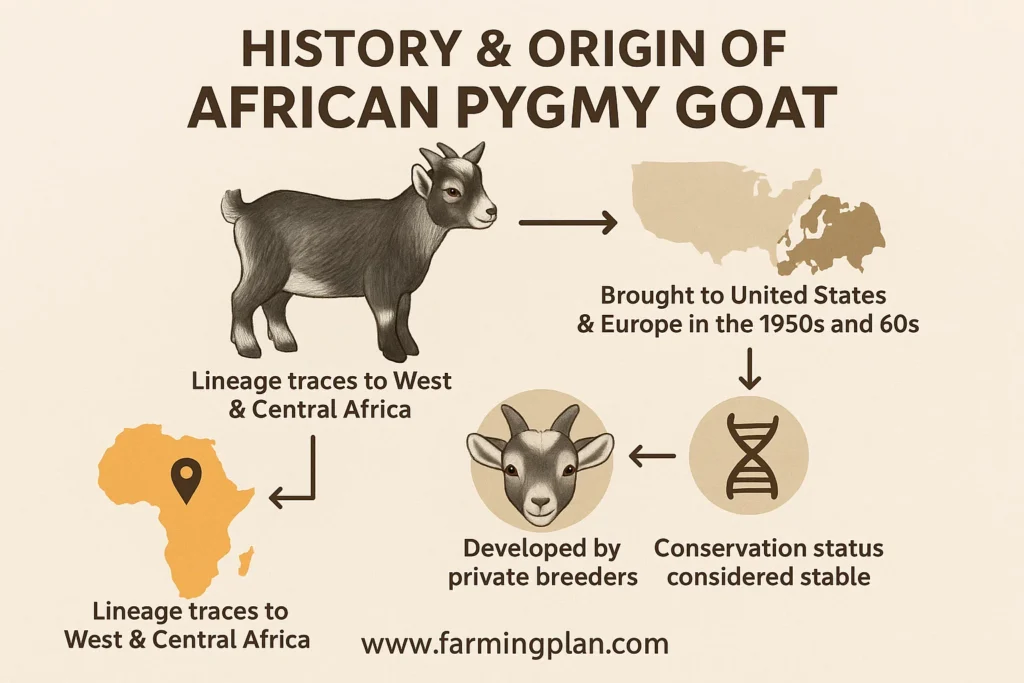
Over time, their popularity grew beyond labs and exhibits. Private breeders started recognizing the goat’s potential as a pet and farm animal. By selecting for friendly temperament and miniature size, breeders developed what we now know as the African Pygmy Goat. These goats are part of the Capra aegagrus hircus species and carry a natural dwarf goat gene that gives them their compact size. Despite their popularity in developed countries, they remain close relatives of African dwarf goat breeds still found throughout Sub-Saharan Africa. Their conservation status is considered stable, but ethical breeding practices are essential to keep this breed healthy and happy.
Read More: Cashmere Goat: That Produces the Best Wool
Characteristics of African Pygmy Goat
African Pygmy Goats may be small, but their features make them stand out. Adult pygmies weigh about 35 to 60 pounds and stand just under 2 feet tall. They’ve got a broad chest, short legs, and a stocky build that gives them a cute, compact look.
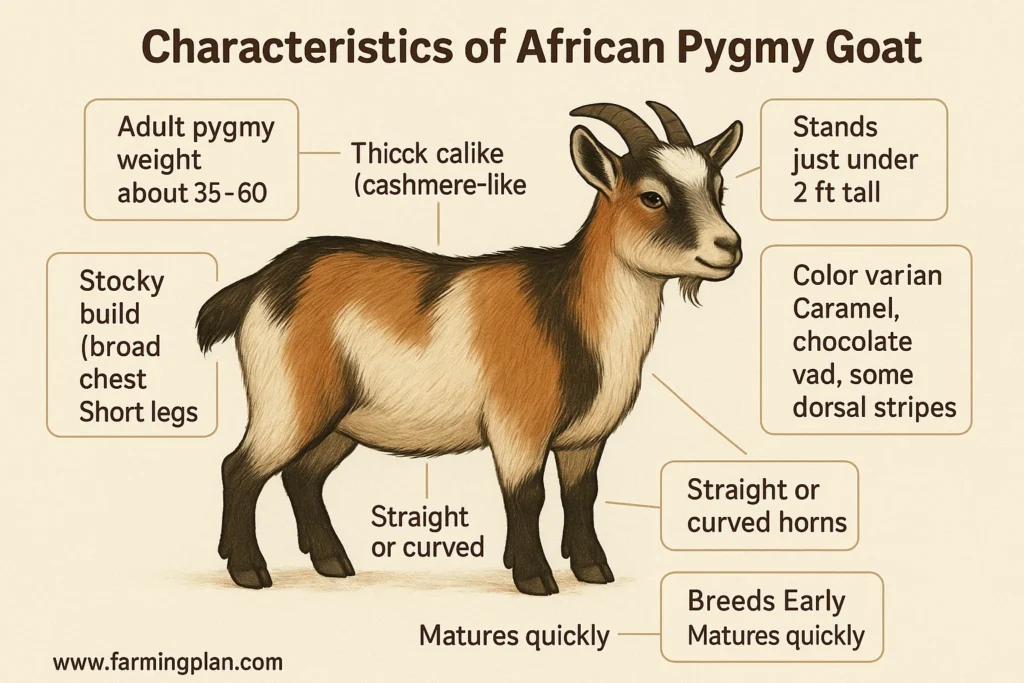
Their coat is thick and cashmere-like, offering protection in cooler climates. Coat colors vary widely—from caramel and chocolate to black, white, and even mixed patterns with dorsal stripes. Some even sport unique traits like goat wattles (those little skin flaps on their neck) and straight or curved horns. Males (bucks) tend to be a bit stockier than females (does), but both are equally adorable. They mature quickly and can breed as early as 4 to 5 months, although responsible breeders wait longer. And don’t be fooled by their size—these miniature goats are bursting with energy!
Read More: Thuringian Goat: A German Breed of Goats
Nature & Temperament of African Pygmy Goat
African Pygmy Goats are known for their docile, playful, and curious nature. I’ve always loved how these goats follow me around the farm like dogs. They thrive on interaction and enjoy the company of both humans and fellow herd animals.
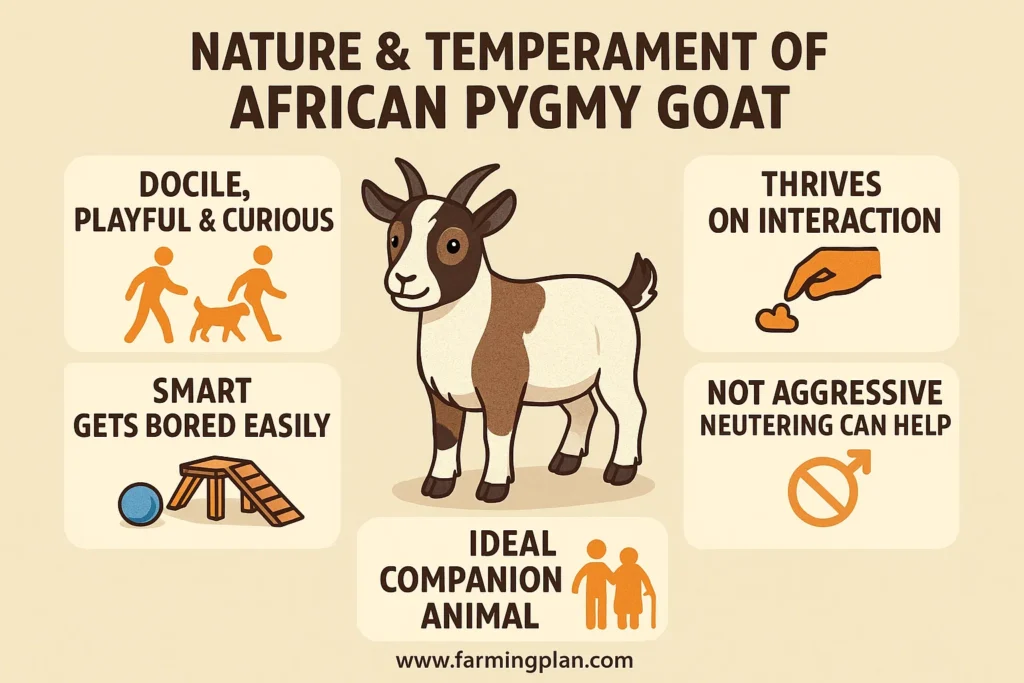
They’re smart, too—able to learn names, respond to treats, and even navigate goat agility courses. That intelligence also means they get bored easily, so providing toys, climbing structures, and regular attention is key. They’re perfect for kids, elderly folks, or anyone looking for a low-maintenance but interactive companion. While bucks can be a bit more assertive during mating season, they’re generally not aggressive. Neutering can reduce hormonal behavior. Overall, pygmy goats are ideal companion animals, especially if you have a bit of space and love to share.
Read More: Oberhasli Goat: Stunning Dairy Star With a Calm Soul
Food & Diet
Feeding an African Pygmy Goat isn’t complicated, but it does take some planning. They need a mix of fresh hay (like timothy or orchard grass), a goat-specific pellet, and occasional treats like fruits and veggies.
Goats are browsers, not grazers. That means they prefer shrubs, leaves, and twigs over just grass. Make sure they get access to fresh water at all times, and don’t forget a salt or mineral block to support their nutritional needs. Avoid feeding them human snacks, moldy food, or too many sugary treats. I also steer clear of alfalfa hay for males, as it can lead to urinary issues. Stick to a routine feeding schedule, and keep their food area clean to prevent parasites and goat worms.
Usage & Purpose
While African Pygmy Goats are mostly known as pet or exhibition animals, they actually serve multiple purposes. In some regions, they’re used as dairy goats, producing a small but rich amount of milk. Their milk is high in butterfat and can be great for soaps or small-batch dairy.
They also help with land management, clearing underbrush and weeds naturally. Some farmers use them as companion animals for larger livestock or horses, while others enjoy showing them in competitions organized by the National Pygmy Goat Association. Because of their manageable size and easy-going nature, they’re also excellent educational animals for schools or therapeutic animals for care homes. Trust me—these goats bring smiles wherever they go.
Special Features
One of the standout features of the African Pygmy Goat is its resilience. These goats can thrive in limited space, making them ideal for backyard farming. Their abundant hair growth and strong immunity make them hardy animals in most weather conditions.
They also have an impressive dwarf gene pool that helps preserve their size across generations without significant health risks when bred responsibly. Pygmy goats tend to have multiple kids per birth, increasing their appeal for breeders. Another fun fact? Their coat patterns and hair color are extremely varied. You could have ten pygmy goats, and none will look the same! That diversity, paired with their friendly nature, makes them a truly exotic animal treasure.
Tiny In Size, Mighty In Personality – African Pygmy Goats Prove That Good Things Really Do Come In Small Packages!
Health Issues & Prevention
Like any farm animal, African Pygmy Goats can face health issues. The most common include internal parasites, like goat worms, and external ones like lice or mites. Regular deworming, clean bedding, and rotational grazing help prevent outbreaks.
Also watch for hoof problems, such as overgrowth or infections, especially in wet climates. I recommend trimming hooves every 4-6 weeks. Make sure they have proper electric fencing or secure pens to avoid injury and escape. Vaccinations and regular checkups from a vet familiar with goats are a must. Some breeders also face issues like urinary stones in bucks, often due to diet. Stay vigilant and proactive, and your goats will stay healthy.
Step-by-Step Pet Owner Care Guide
Step 1: Create A Safe And Spacious Home
Start with at least 200 square feet per goat in a secure, fenced area. Use goat-proof fencing (no gaps, at least 4 feet high). Provide a cozy shelter with straw or wood shavings for bedding. Good ventilation, dry flooring, and protection from the elements are key to keeping them happy.
Step 2: Set Up A Feeding & Water Routine
Feed them fresh hay daily, supplement with quality goat pellets, and provide fruits/veggies a few times a week. Clean water must always be available. Add a mineral block or goat lick to boost nutrition.
Step 3: Keep Them Clean And Groomed
Brush their coat weekly to keep their fur shiny and remove dirt or loose hair. Trim hooves monthly, and keep their shelter tidy to avoid skin issues or parasites. I also check for lice or mites every season.
Step 4: Socialize And Entertain
Goats are herd animals. Keep at least two to avoid loneliness. Add climbing structures, toys, and safe obstacles to keep them active. Spend time with them daily—they love the attention and it helps prevent boredom.
Step 5: Stay On Top Of Health Care
Stick to a deworming schedule, consult your vet for vaccinations, and check eyes, hooves, and coat regularly. Watch for changes in behavior or appetite—early signs something’s off.
Expert Tips & Best Practices
- Always get goats from a reputable breeder who screens for genetic health issues.
- Never keep one goat alone. They need buddies.
- Avoid overfeeding treats—especially bread, corn, or sweets.
- Use electric fencing to keep them in and predators out.
- Goat-proof everything. They’re great escape artists.
- Provide regular enrichment—they get bored easily.
- Watch out for bucks during mating season. They can get pushy.
- Get a goat-specific first aid kit and keep it handy.
FAQ
How much does an African Pygmy Goat cost?
Prices vary but typically range between $100 to $400, depending on age, sex, and breeder reputation.
Do African Pygmy Goats make good pets?
Absolutely! They’re friendly, fun, and easy to care for, especially in small backyard setups.
Can African Pygmy Goats live indoors?
Not ideally. They need outdoor space to roam, climb, and play, although they can be trained to be very social.
What do I need to get started with pygmy goats?
Basic shelter, secure fencing, good food, a water source, and at least two goats. Also plan for regular vet care.
How long do African Pygmy Goats live?
With proper care, they live 10 to 15 years.
Conclusion
If you want a hardy, adorable, and interactive addition to your farm or family, the African Pygmy Goat fits the bill perfectly. These goats aren’t just cute—they’re smart, social, and surprisingly easy to care for. Whether you’re a hobby farmer, pet enthusiast, or breeder, pygmy goats bring unmatched charm to your life. They require thoughtful care, but they give back tenfold in joy, companionship, and fun. Ready to welcome a few mini goats into your world? Trust me—you won’t regret it.

